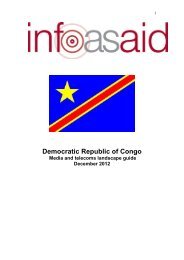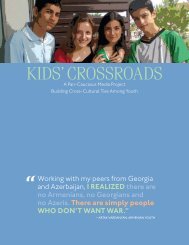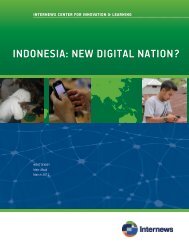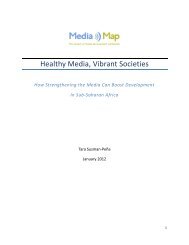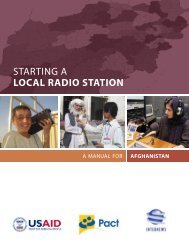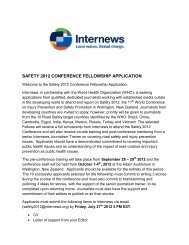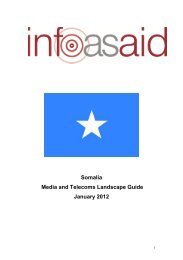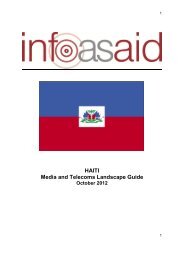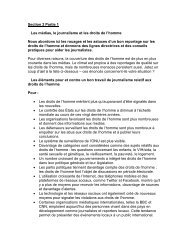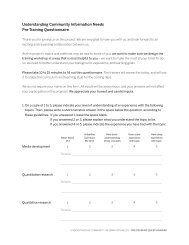Ethiopia Media and Telecoms Landscape Guide - Infoasaid
Ethiopia Media and Telecoms Landscape Guide - Infoasaid
Ethiopia Media and Telecoms Landscape Guide - Infoasaid
You also want an ePaper? Increase the reach of your titles
YUMPU automatically turns print PDFs into web optimized ePapers that Google loves.
13In 2010, Prime Minister Meles Zenawi likened VOA’s Amharic service to Radio MilleCollines, the Rw<strong>and</strong>an radio station which incited hatred <strong>and</strong> violence against Tutsisin the 1994 genocide.The US-based civil liberties organization Freedom House downgraded <strong>Ethiopia</strong> from“partly free” to “not free” in its 2011 Freedom in the World index of political liberties.This move followed a government crackdown on opposition parties <strong>and</strong> the mediaduring <strong>and</strong> after the 2010 general elections.The ruling EPRDF <strong>and</strong> its allies won all but two of the 547 seats in Parliament inthese elections.The press freedom organization Reporters Sans Frontieres (RSF) ranked <strong>Ethiopia</strong>139 th out of 178 countries listed in its 2010 Press Freedom Index.“Prime Minister Meles Zenawi <strong>and</strong> his government have been tightening their gripon news <strong>and</strong> information in the last months. <strong>Ethiopia</strong> has joined the list of sub-Saharan countries that are keeping a close eye on the media <strong>and</strong> are trying tocontrol or influence editorial policies. Due to their increasing intolerance, theauthorities are doing everything they can to stifle the critical impulses of journalists<strong>and</strong> to make life difficult for the private media,” RSF said in a statement in March2011.There are some privately owned newspapers in the capital Addis Ababa, but theirnews <strong>and</strong> current affairs coverage is dominated by shallow <strong>and</strong> largely uncriticalreporting of the government.<strong>Ethiopia</strong>n journalists working for the international media say they are frequentlycontacted by government officials who complain about their reports, which areclosely monitored.Visiting foreign journalists are generally free to report, provided they obtaingovernment press accreditation <strong>and</strong> conform to other procedural regulations.CNN, BBC, Euronews <strong>and</strong> Al-Jazeera are available on satellite television. But this isbeyond the means of most <strong>Ethiopia</strong>ns.The ERIS Audience Survey <strong>Ethiopia</strong> 2011www.eris.org.uk/news/index.php?id=476&year=2011, a companion report to theERIS <strong>Ethiopia</strong> <strong>Media</strong> Mapping Survey, found that 80% of <strong>Ethiopia</strong>ns use radio as asource of news <strong>and</strong> information.The survey of 3,999 people was conducted in several different regions of <strong>Ethiopia</strong> inlate 2010.



